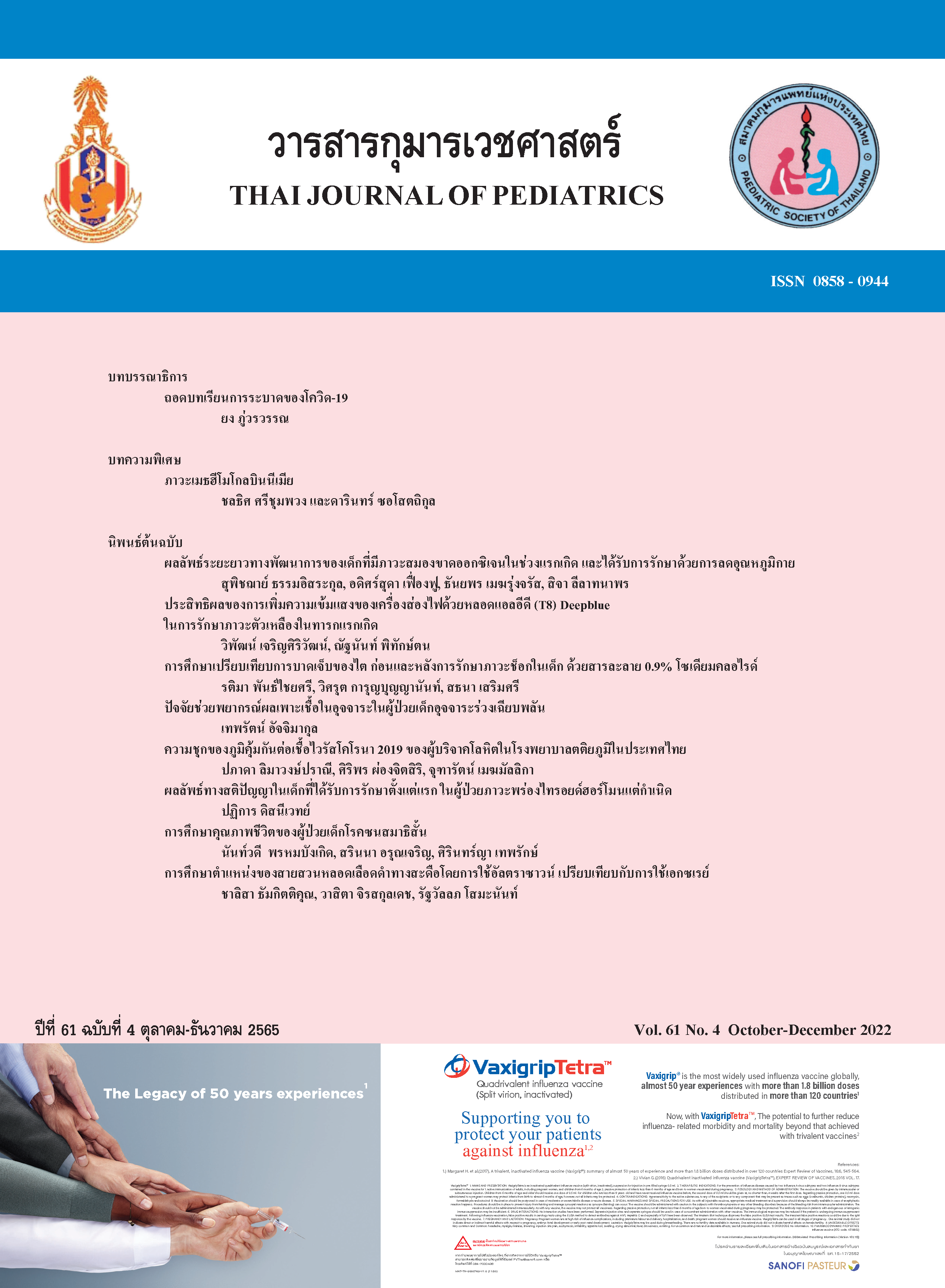ผลลัพธ์ทางสติปัญญาในเด็กที่ได้รับการรักษาตั้งแต่แรกในผู้ป่วยภาวะพร่องไทรอยด์ฮอรโมนแต่กำเนิด
บทคัดย่อ
ความเป็นมา: ภาวะขาดไทรอยด์ฮอร์โมนแต่กำเนิดเป็นสาเหตุหนึ่งที่สามารถป้องกันความพิการทางสติปัญญา การรักษาด้วยยา L-thyroxine สามารถทำให้สมองมีพัฒนาการและการทำงานที่ปกติ
วัตถุประสงค์: เพื่อศึกษาผลของสติปัญญาในผู้ป่วยขาดไทรอยด์ฮอร์โมนแต่กำเนิดที่ได้รับการรักษาระยะแรกในช่วงก่อนวัยเรียน
วัสดุและวิธีการ: การศึกษาแบบย้อนหลังจากเวชระเบียนผู้ป่วยที่มีภาวะขาดไทรอยค์ฮอร์โมนแต่กำเนิดจำนวน 27 ราย วินิจฉัยจากโปรแกรมการตรวจกัดกรองในทารกแรกเกิดระหว่างปี พ.ศ.2541 - พ.ศ. 2560 ที่ได้รับการตรวจระดับทางสติปัญญา (IQ tes) ที่อายุ 6-8 ปี ข้อมูลที่ศึกบาประกอบด้วย เพศ น้ำหนักแรกเกิด อายุที่เริ่มให้ยา L-thyroxine ระดับ Free T4 และ TSH ก่อนรักษา ขนาดยา L-tlyroxine ที่เริ่มรักษาชนิดของภาวะขาดไทรอยค์ฮอร์โมนแต่กำเนิด อายุขณะที่ตรวจ IQ test ผล IQ test ประกอบด้วย full scale IQ, verbal IQ และ performance IQ
ผลการศึกษา: ผู้ป่วยภาวะขาดไทรอยด์ฮอร์โมนแต่กำเนิด 27 ราย พบว่า 7 รายได้รับการรักษาด้วย L-thyroxine ก่อนอายุ 14 วัน 20 รายได้รับการรักษาด้วย L-thyroxine ที่อายุมากกว่า 14 วัน ระดับ free T4, TSH น้ำหนักขณะเริ่มรักษา ขนาดยา L-thyroxine ที่เริ่มรักษาไม่แตกต่างกันระหว่าง 2 กลุ่ม ค่าเฉลี่ยคะแนน full IQ มีค่าแตกต่างกันระหว่าง 2 กลุ่มอย่างมีนัยสำคัญทางสถิติ (p=0.01) แต่ไม่พบความแตกต่างของ verbal IQ และ performance IQ ของทั้ง 2 กลุ่ม ผล thyroid scan พบ dyshormonogenesis 12 ราย agenesis/hypoplasia 5 ราย ectopic 10 รายค่าเฉลี่ยคะแนน full IQ ในกลุ่ม dyshormonogenesis สูงกว่ากลุ่มที่เหลือ การศึกษานี้พบว่าอายุที่เริ่มให้การรักษาและชนิดของภาวะขาดไทรอยด์ฮอร์โมนมีผลต่อพัฒนาการทางสติปัญญาปกติ (full IQ score 90) อย่างมีนัยสำคัญทางสถิติ (p=0.01)
สรุป: ผู้ป่วยเด็กที่มีภาวะขาดไทรอยด์ฮอร์โมนแต่กำเนิดได้รับการรักษาก่อนอายุ 14 วัน พบว่ามีค่าระดับสติปัญญาปกติเมื่อเปรียบเทียบกับกลุ่มที่ได้รับการรักษาหลังอายุ 14 วัน ระยะเวลาที่ให้การรักษาและชนิดของภาวะขาดไทรอยด์ฮอร์โมนแต่กำเนิดมีบทบาทสำคัญต่อพัฒนาการทางสติปัญญาของผู้ป่วย
Downloads
เอกสารอ้างอิง
Rosenthal M, Addison GM, Price DA. Congenital hypothyroidism: increased incidence in Asian families. Arch Dis Child. 1988;63:790–3.
Sukthomya V, Sukthomya C, Silaparasamee S, Denyookta D, Kunsakawin S. Neonatal screening for hypothyroidism in southern Thailand. Thai J Radiol 1986;23:73–9.
Mahachoklertwattana P, Phuapradit W, Siripoonya P, Charoenpol O, Thuvasethakul P, Rajatanavin R. Five-year thyrotropin screening for congenital hypothyroidism in Ramathibodi Hospital. J Med Assoc Thai 1999;82(Suppl 1):s27–32.
Wasant P, Liammongkolkul S, Srisawat C. Neonatal screening for congenital hypothyroidism and phenylketonuria at Siriraj Hospital, Mahidol University, Bangkok, Thailand – a pilot study. Southeast Asian J Trop Med Public Health 1999;30(Suppl 2):33–7.
T h a i t h u m y a n o n P, S r i v u t h a n a S , poshyachinda M. Neonatal screening for hypothyroidism at a university hospital in Thailand. Southeast Asian J Trop Med Public Health 1999;30(Suppl 2):25–7.
Ratrisawadi V, Horpaopan S, Chotigeat U, et al. Neonatal screening program in Rajavithi Hospital, Thailand. Southeast Asian J Trop Med Public Health 1999;30(Suppl 2):28–32.
C h u r e s i g a e w S , R a t r i s a w a s d i S , Thaeramanophab S. Thyrotropin screening for congenital hypothyroidism in Queen Sirikit National Institute of Child Health, Thailand (during year 1995–2000). J Med Assoc Thai 2002;85:782–8.
Panamonta O, Tuksapun S, Kiatchoosakun P, Jirapradittha J, Kirdpon W, Loapaiboon M. Neonatal screening for congenital hypothyroidism in Khon Kaen University Hospital,forthefirstthree years, a preliminaryreport. J Med Assoc Thai 2003;86:932–7.
Charoensiriwatana V, Janejai N, Boonwanich W, Krasao P, Chaisomchit S, Waiyasilp S. Neonatal screening program in Thailand. Southeast Asian J Trop Med Public Health 2003;34(Suppl 3): 94–100.
Somchit Jaruratanasirikul, Jutarat Piriyaphan, Tansit Saengkaew, Waricha Janjindamai and Hutcha Sriplung The etiologies and incidences of congenital hypothyroidism before and after neonatal TSH screening program implementation: a study in southern Thailand. J Pediatr Endocrinol Metab 2018; 31: 609–17.
Rovert JF. The role of thyroid hormones for brain development and cognitive function. Endocr Dev 2014;26:26-43.
Kreisner E, Schermann L, Camargo-Neto E, et al. Predictors of intellectual outcome in a cohort of Brazillian children with congenital hypothyroidism. Clin Endocrinol 2004;60:250-5.
Boileau P, Bain P, Rives S, Toublanc JE. Earlier onset of treatment or increment in LT4 dose in screened congenital hypothyroidism: which as the more important factor for IQ at 7 years? Horm Res 2004;61:228-33.
Seo MK, Yoon JS, So CH, Lee HS, Hwang JS. Intellectual development in preschool children with early treated congenital hypothyroidism. Ann Pediatr Endocrinol Metab 2017;22:102-7.
Salerno M, Militerni R, Maio SD, Bravaccio C, Gasparini N, Tenore A. intellectual outcome at 12 years of age in congenital
hypothyroidism. Eur J Endocrinol 1999;141:105-10.
Rahmani K, Yarahmadi S, Etemad K, et al. Intelligence quotient at the age of six years of Iranian children with congenital hypothyroidism. Indian Pediatr 2018;55:121-4.
Rovet J. Children with congenital hypothyroidism and their siblings: do they really differ? Pediatrics 2005;115:e52-7.
ดาวน์โหลด
เผยแพร่แล้ว
รูปแบบการอ้างอิง
ฉบับ
ประเภทบทความ
สัญญาอนุญาต

อนุญาตภายใต้เงื่อนไข Creative Commons Attribution-NonCommercial-NoDerivatives 4.0 International License.



